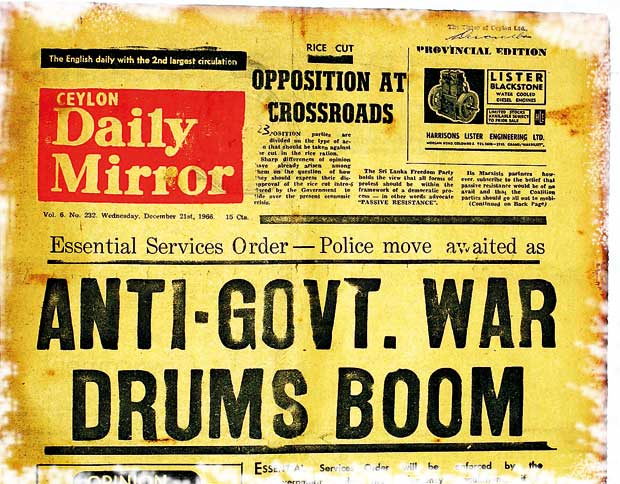Reply To:
Name - Reply Comment
Last Updated : 2024-04-27 00:40:00

Sri Lanka is heading towards foreseeable crisis centring rice. This is not the first time we are up against a rice crisis, nor will it be the last. In 1943 and 1944, a rice slump was countered with a slashed half-measure all rounds. Rice is the staple food of Sri Lankans. It is a politically perceptive commodity with which delivery disruption causes people grief.
The National government of Dudley Senanayake [1965-1970] was National by every sense of its meaning. With de facto Tamil leader, S.J.V. Chelvanayakam, Sinhala extremist K.M.P. Rajaratne, father of Marxism Philip Gunawardane and a pillar of Western Capitalism, J.R. Jayewardene all united under statesman Dudley.
However, it suffered a serious setback five decades ago, when it lost all three bye-elections held on October 24, 1966. The opposition led by Sirimavo’s SLFP as usual focused on the ethnic issue during the campaign highlighting the fact that main Tamil party [Chelvanayakam Federal Party] was in an unprincipled alliance with the UNP.
Reeling from the loss, the government confronted an even more serious problem. The major share of rice supplies were coming from Burma as the local production then was far below the requirements. In December Burmese harvest failed drastically resulting in failure to deliver the quantity of rice contracted. The ‘Hal Potha’ [ration card], a legacy of World War II, introduced by colonial rulers which was considered by the people as their birthright was in operation.
Under this arrangement every adult citizen was entitled to two measures [2 kgs] of rice at a highly subsidized price. In fact a measure costing -/70 cents was sold at -/25 cents to the consumer. By the end of December 1966 no rice was available from any source to supply people with the ration per person per week.
J.R. Jayewardene, State [Super?] Minister in 1966
The Prime Minister Dudley Senanayake was presented with a problem that he never wished to avoid dealing with; either a price increase or a reduction in the ration. The Hartal of 1953 a violent mass agitation triggered by withdrawal of the subsidy was backed by Marxist parties, which in turn had led to his own resignation as PM yet haunting him. JR Jayewardene, State [Super?] Minister in 1966, advised by Esmond Wickremesinghe [father of Ranil W.] consulted an Indian economist named Professor BR Shenoy, who presented a paper proposing a reversal of popular economic policies and introduction of a radically different approach.
Such views had little chance of adoption in this country in 1960s though the ‘Super Minister’ JR was much readier to consider the need for a reduction in the rice ration, and price it at close to the price at which it was purchased from Burma as possible. But he could not convince Dudley who earlier in the year disagreed with the IMF too, when it recommended a cut in subsidy, in spite of government’s earlier undertaking that it would review the subsidy.
A committee, as usually done by UNP governments, was appointed to make recommendations on the matter. The committee came up with a few alternatives; all of them required an increase in price or reduction in the ration or both.
Apart from that, agricultural education for farmers and development of irrigation and transport systems are other approaches that could be pursued.
The government was desperate realizing that it was not possible to continue with the ration of 2 kgs per person per week. The impending rice crisis saw JRJ and his PM adopt different attitudes. JR regarded the crisis as an opportunity to make radical policy change in subsidies and extend it to changes in economic and fiscal policies as well.
Dudley Senanayake was opposed to any tampering with food subsidies; the events of 1953 and the Hartal in August of the year were deeply etched in his memory.
JR’s and his chief adviser Esmond Wickremesinghe combination during the rice crisis made Dudley suspicious of JR, he felt that any recommendation to review of the policy on food subsidies, let alone for their elimination, was a trap they had laid for him, in the apparent hope that if political disturbances erupted as a result JR would be benefitted and replaced him as PM.
Whatever, the good intentions the Prime Minister had and no one doubted he had them—were negated by the pampering offer of free rice. His cabinet, doubtless, played on the traditional feeling that Sri Lankans welcome anything free—even a headache. But the short term lure opens the gates to long term disaster. Finally PM bowed down, “This is a war” he declared, “We must cushion the blow,” so two measures was reduced to one, but it would be issued free.
Increase in Demand during the 1940
There has been an increase in demand during the 1940 and early 50 decades for rice in many parts of the world especially in China, the Middle East, Africa, India and Sri Lanka. To counteract the increase in price, the top exporting countries of rice have reduced their exports considerably to keep home prices low and to offset inflation. There were several factors that added to the rice crisis of
which some were beyond the government’s discretion.
The skyrocketing crude oil prices in the world market made fertilizers in the production of rice much more expensive. It also contributed to the upward trend in the cost of rice since transportation was a charge added by providers.
Opposition Reacts
And from 1948 to 1953, an equally grim situation touched off a half measure reduction, though the price remained untouched until 1953, when the full subsidy was withdrawn. The Marxists, LSSP and CP backed by their powerful Trade Union arms IN 1966 professed violent street protest in line with 1953 Hartal. But its major partner the SLFP headed by Sirimavo Bandaranaike was not in favour. Especially Leader of Opposition Sirimavo vehemently objected to the idea.
The Current Rice Crisis
The Director General of Meteorology says that Sri Lanka will receive less rainfall in January and February. According to the Director General, even if there is rainfall there is no solution regarding the scarcity of water.
In areas like Polonnaruwa, Hambantota and Anuradhapura where a better harvest is expected, cultivation during the Maha season has been limited. Of the 190,000 acres of paddy land in the Kurunegala District, only 19,000 acres has been cultivated. That is a warning which has come from the Sri Lankan farmers. Lack of rain and issues surrounding fertilizer have caused a situation where the anticipated harvest for the Maha Season cannot be collected. There is a possibility that this year’s Maha season harvest would be half of what was obtained last year.
The ‘Hal Potha’ [ration card], a legacy of World War II, introduced by colonial rulers which was considered by the people as their birthright was in operation.
National organizer – All Ceylon Peasants Federation has said, “… the farmers were not provided with fertilizer on time in order to yield a successful harvest. Fertilizer is required within 45 days. Minister P. Harrison says, the Paddy Marketing Board has made a decision to release paddy stocks. He also added that there would be positive news for the consumers. “… orders have been given to the private importers to import nadu rice, and that the price of rice would be reduced. But it would be immature to think that this crisis is restricted to Sri Lanka. According to the most recent reports, the entire region (where the staple food is rice) is facing a `rice crisis` of an unparalleled scale. Food prices are moving up globally and rice is no exception.
Sri Lanka is heading for a sharp drop in rice production in the main cultivation season with only a third of the area sown so far amid the worst drought in at least five years, with import restrictions already pushing rice prices up. Already rice prices have gone up, with the market reacting quickly to tighter supply conditions and the expected future position. B. V. R. Punyawardena, agro-climatologist at the Department of Agriculture has said that by early December only 30 percent of the 830,000 hectares of paddy that can be grown during Maha rice cultivation season has been sown. He added, “I have not experienced this kind of bad season, International prices could also move up, with variable La Nina conditions. Punyawardena said.”
Long-term solutions to the crisis
The long-term solutions that are being proposed by successive governments are geared towards the country attaining self-sufficiency and aimed at revolutionizing the production process and reduction of the cost of production. It could be achieved through investments in research. Apart from that, agricultural education for farmers and development of irrigation and transport systems are other approaches that could be pursued. Agriculture-related technology should be improved so as to increase the quality of rice. Finally, we can certainly end this rice crisis if we stop the conversion of agricultural lands into industrial centres to a halt.


Add comment
Comments will be edited (grammar, spelling and slang) and authorized at the discretion of Daily Mirror online. The website also has the right not to publish selected comments.
Reply To:
Name - Reply Comment
US authorities are currently reviewing the manifest of every cargo aboard MV
On March 26, a couple arriving from Thailand was arrested with 88 live animal
According to villagers from Naula-Moragolla out of 105 families 80 can afford
Is the situation in Sri Lanka so grim that locals harbour hope that they coul